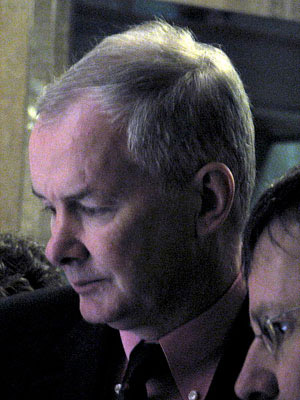
All those celebratory headlines about John Furlong's "exoneration" must have come as a sharp slap to the eight former students whose allegations of mental and physical abuse launched the whole process.
They were forgotten. The media reported Furlong's "horrible nightmare" was over.
It was as if the eight, whose affidavits detailing abuse were the basis for Laura Robinson's Georgia Straight article in September 2012, were invisible. "Worthless Indians," to lift a phrase from the article.
It's true that a huge weight was lifted from Furlong, the former Vancouver Olympic CEO, when the last of three sex-abuse lawsuits was dismissed. The accusations that he sexually abused three native students as an 18-year-old untrained teacher in Burns Lake 45 years ago were devastating.
But the original allegations, still untested in court, should matter. The people who made them should not be so easily forgotten.
The Furlong case has been a test for the media since Robinson's 2012 article. And again, in recent weeks, much of the coverage failed to offer a complete picture of an admittedly complex series of accusations and counter-claims.
Some media reports -- Lori Culbert's coverage in the Vancouver Sun, for example -- were complete and clear and noted that the original allegations have never been addressed, beyond Furlong's denials.
Others though, continued a pattern of ignoring the original allegations or suggesting the Georgia Straight article actually included the allegations of sex abuse. "The allegations against Furlong surfaced in an article in the weekly Georgia Straight newspaper last fall," a Canadian Press report on the sex-abuse lawsuits stated.
They didn't. The three people filed the lawsuits after the article appeared.
Swore affidavits
It's understandable that claims of sex abuse of children captured the most attention, especially given the horrific revelations about residential schools. But the allegations of physical and mental abuse and humiliation were hardly trivial. The eight people who talked to Robinson swore affidavits alleging they were kicked, punched, lashed and berated as "lazy Indians" by Furlong. Some claimed lasting physical and emotional damage.
And no one really seems interested. The former students haven't filed lawsuits, so their allegations won't be tested in that process. It does not appear that the RCMP investigation went beyond the allegations of sexual abuse. In any case, the statute of limitation makes prosecution for anything but serious assaults impossible.
For a time, Furlong seemed prepared to confront the allegations directly. Within days of the original article's publication, he said he would sue the Georgia Straight and Robinson for defamation.
But he dropped the suit against the newspaper a year later. And once the final sex assault-lawsuit was dismissed, Furlong said he would also abandon his lawsuit against Robinson. He felt vindicated, Furlong said, and wanted to get on with his life.
That's his right, of course. Going ahead with the lawsuit would be expensive and keep the issue alive. The case would see Furlong forced to defend his comments about Robinson and give her a platform to demonstrate that the report was accurate.
But how to reconcile Furlong's decision to abandon this suit with his comments about the lawsuits against him?
"It is extraordinary and unacceptable that anyone can make ruinous, toxic allegations against a citizen, put them on the public record via the courts and then abandon them with impunity, seemingly without consequences and leaving untold damage and pain behind," Furlong said in a statement.
Others, like the Vancouver Sun editorial board, Postmedia columnist Christie Blatchford and Globe and Mail columnist Gary Mason offered similar comments. (Mason worked with Furlong on his memoir, which omitted any reference to his 14 months teaching in Burns Lake and said he arrived in Canada four years later, in 1974.)
But Furlong's allegations against Robinson were put on the record in the same way, through the lawsuit and a series of media interviews and statements.
They were, to be sure, far less "ruinous" than allegations of sex abuse. But Furlong said she was incompetent, had a 20-year history of botched reporting and was motivated by a vendetta against him and contempt for male authority figures in sports. He alleged Robinson was waging a campaign of harassment and that she had taken the allegations of sex abuse to the RCMP. All of which she denies.
Double standard
And now he has abandoned the allegations "with impunity," without having pursued the suit in any urgent way over the last two years.
Furlong's defamation suit also implicitly attacked the eight former students who provided affidavits to support Robinson's Georgia Straight article. If his denial was to be accepted, their accounts of their lives were not to be trusted. They were dishonest, or dupes, or simply incapable of understanding their own experiences.
The students would almost certainly have had a chance to defend themselves in court if Furlong had pursued his case.
There is a striking double standard here. Allegations made, and abandoned, against a well-respected man like John Furlong are widely condemned.
But what about Richard Perry? He's a hereditary chief in the Babine First Nation, whose affidavit says Furlong's beatings left him with brain damage.
No one seems much worried about Perry's allegations, or the fact that Furlong's decision to abandon his defamation suit, which would have seen Perry's claims tested in court.
Perry might still be heard. Furlong has dropped his lawsuit, but Robinson is still suing him for defamation.
Perry, and the other seven people who alleged abuse, might still have the chance to tell their stories. And Furlong's lawyer might have the chance to question them.
The Furlong story has been a challenge for the media. A well-respected man faces terrible accusations from the past and proclaims his innocence. But the media and society have too often failed to pay attention when the powerless tell their stories.
The story was always going to be about John Furlong. He's famous, and popular, and faced the accusations.
But surely it should also have been about Richard Perry and the seven other people who came forward with allegations of abuse. Their accusations could be challenged. But they should not be ignored.
The former students should matter just as much as John Furlong. And they didn't.
Due to the nature of this story, comments are closed. ![]()
Read more: Indigenous, Rights + Justice














